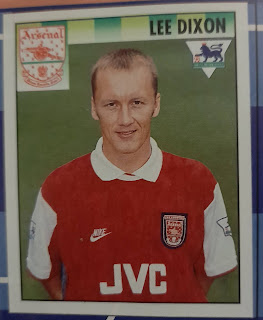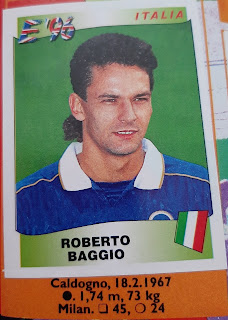6: Lee Dixon, Arsenal, Merlin’s Premier League 95 Sticker Collection
Today Richard Allinson takes a look at a fine footballer who, despite domestic and continental success, somehow missed out on the international recognition he probably deserved. Perhaps he expressed doubts over Carlton Palmer’s ability in the middle of the park. It’s possible he lacked the hardman credentials displayed on the opposite flank by Graeme Le Saux. Maybe he was reluctant to “hit Les”. Either way, despite being overlooked by England, he got plenty out of his career. Over to Rich.
When it comes to international football, over the years numerous mangers have bemoaned the fact that they don’t have the luxury of time to spend with their squad to build a cohesive unit and have consequently chopped and changed their side looking for a magic formula. This was no more evident than with post-Italia ‘90 England where Graham Taylor selected seventeen different defenders and three goalkeepers during his three years in charge. What always confused me, even as a nine year old, is why Taylor didn’t just lift and shift the Arsenal back-line of Seaman, Dixon, Adams, Bould and Winterburn into the England team. They knew each other’s game inside out, they were really good at putting one arm in the air and stepping forward in unison and, most importantly, they never conceded any bloody goals. Despite their ridiculous defensive record with the Gunners, remarkably Taylor didn’t try this even once. I never got it, and it still baffles me now that Lee Dixon only won 22 caps for England over a nine year period. For context, Phil Jones has 27.
Dixon’s career is synonymous with Arsenal, which is not surprising given he played 458 games, scored 25 goals and won 4 league titles, 3 FA Cups, 2.5 Charity Shields and a European Cup Winners’ Cup with them. However, they were actually his fifth club after earlier spells with Burnley, Chester City, Bury and Stoke City from whom he joined the Gunners in January 1988. He was brought in to fill the not inconsiderable boots of Viv Anderson who had just moved to Manchester United, but was initially kept out of the side by an out of position Nigel Winterburn. Dixon only managed six games that first year, but from the 1988/89 season onwards he made the right back slot his own for the next decade, despite the best efforts of Nelson Vivas to dislodge him.
As far as first full seasons go, 1988/89 was a pretty remarkable one. With the Gunners in the hunt for their first league title since 1971, they went into the last game of the season needing to beat Liverpool by two clear goals at Anfield to clinch top spot. The story is so famous it doesn’t need me to tell it again, but needless to say, Arsenal had the last laugh. Winning the league title in such dramatic fashion is probably quite hungry work, and so after the match Dixon was making his way through Liverpool when he nipped into a chippy, still dressed in his Arsenal jacket and tie. Luckily for Dixon, not only did he manage to avoid getting lynched by the angry Liverpool fans also buying their post-match haddock, but the chip shop man was an Evertonian, and so gave Dicko some extra chips as a congratulations. Extra chips and a league title in one night? Chuck in a battered sausage and you’ve completed life.
Of course the chip shop culture disappeared at Arsenal once Arsène Wenger joined in October 1996, and to be fair although he replaced gravy with grapefruit and curry sauce with quinoa he did also achieve quite a lot of footballing success. On joining the Gunners, it was reported that Wenger intended on replacing his defence quite quickly, but either Gilles Grimandi and Remi Garde weren’t immediately available or he realised that the players he had at his disposal were actually quite good, and the famous back line (including Martin Keown and latterly Sol Campbell) went on to be the foundation of Wenger’s Arsenal sides for many years. Under Wenger, Dixon went on to win the “double” twice (in 1997/98 and 2001/02) and it was after the second of these that Wenger closed down brief contract talks with “No Lee. It is time.” And with those strangely eloquent words, Dixon’s playing days came to a close at the age of 38.
So Lee Dixon then, overall he had a remarkable career as part of arguably the best defensive unit in top flight history. He won silverware in three different decades, had a front row seat for the revolution of English football, and has carved out a career as a well respected pundit since retiring. And to think, I got all the way through this article without mentioning the own goal he scored against Coventry City at Highbury in 1991.





Comments
Post a Comment